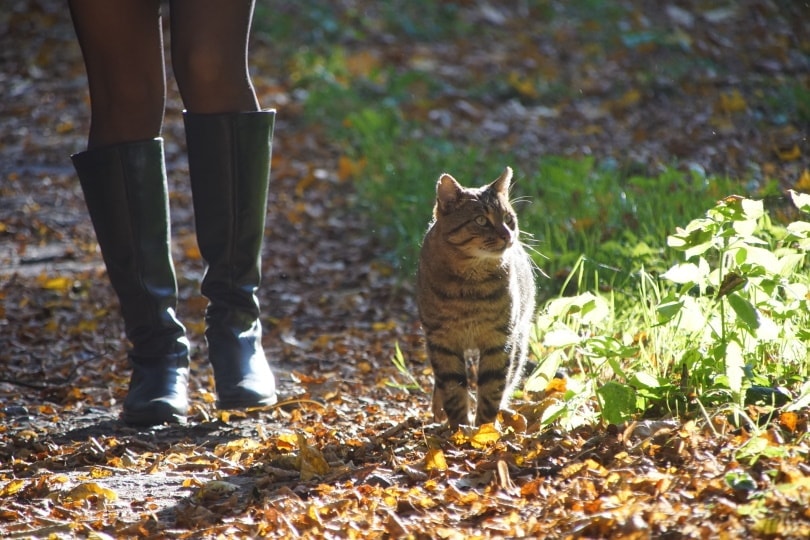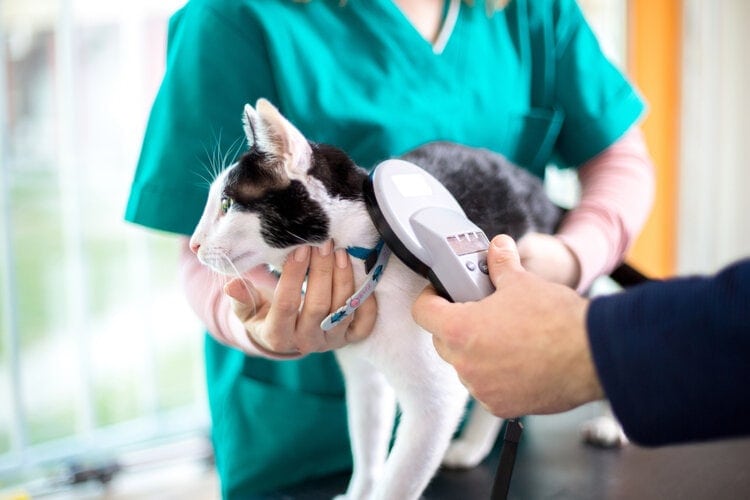How to Find a Lost Cat: 9 Effective Tips & Tricks
By Hallie Roddy
Updated on

Even if you keep your cat indoors at all times, felines are naturally curious animals and some of the world’s best escape artists. Whether they pried themselves through a screen door or found another way to exit, your cat getting lost is a scary time for anyone. Even those who allow their cats to wander outdoors get nervous when they haven’t seen them for a while.
Luckily, it is possible to learn how to find a lost cat in the woods or around a neighborhood if you have accurate information and can put yourself in their shoes.
Top 9 Tricks for Finding a Lost Cat:
1. Take Precautions
It’s obviously going to be much easier to find your cat if you have them microchipped or put a tracker on their collars. Preventative measures are the best way to prepare for if your cats escape and can’t find their way home and most vets today offer microchipping for a low cost. Some cat collars now come with trackers, but they can easily break off or wiggle out of them.
It would also be wise to keep a current photograph of your cat handy in case you need to put up flyers around local shelters. You should also do regular sweeps of the house to ensure there are no windows open or potential escape routes for your kitty to find.

2. Remain Calm
Indoor cats that finally get outside are often scared of the new surroundings. The chances of them hiding somewhere close to the house are high. They could be hiding under a porch or in a bush. Slowly walk the perimeter of your house and calmly call their name. Being quiet also helps you hear if they’re calling back to you. Loud noises like shouting or clapping could make them feel even more anxious and make them run further away.
3. Set Out Food and Water
Outdoor cats need a reliable source of food and water. Set out some of their favorite wet cat food and water to lure them closer to the house. This ensures that they stay fed and hydrated and increases the chance of you finding them. You might also consider putting a cardboard box with some warm bedding outside in case they need shelter.

4. Check Inside the House
Another tip for finding a lost cat is to ensure that they’re not just hiding indoors. Cats can make their way into some hard-to-reach places when you’re not looking. Make sure to thoroughly check every single room in the house and any potential hiding places.
5. Contact Local Shelters
If anyone else found your cat, they are most likely going to take it to the local animal shelter. Make sure to call all the shelters in your area and ask if any cats fitting your pet’s description have been turned in. You can also make up flyers and hang them there to help spread the word.

6. Search At Night
One of the best times to look for lost felines is at night when the rest of the world is quiet and asleep. Take a few cans of cat food outside with you and pop the cans in the open. The sound can travel further than you think when it’s quiet and might lure them closer to the house.
7. Set Up a Trap
There are plenty of humane traps that work perfectly for finding your cat without hurting them. All you need to do is set their food inside and hope that your feline friend makes their way into the cage.

8. Spend More Time Outdoors
You won’t ever spot your lost cat if you’re never outside to see them. Spend some extra time outdoors to increase the likelihood of spotting them.
9. Check Any Trees on the Property
Cats love to sit in high locations, and it is part of their natural instinct to climb into trees. Thoroughly check all the trees on your property in hopes that they are just stuck on a tall branch.
Final Thoughts
The sad truth is that not every lost cat is going to find their way back home. If you cover all of your bases and do everything necessary, though, you increase your odds of bringing them home safely.
As hard as it sounds, try to stay focused on finding them and remain positive. Some cats thrive in the outdoors, and there is no reason to assume the worst. We hope these tips for finding a lost cat will help bring your kitty home and make them feel safe once more.
See also:
- Is Dieffenbachia Toxic to Cats? Keeping Your Cat Safe
- Is Fittonia Toxic to Cats? Keeping Your Cat Safe
Featured Image Credit: Piqsels











